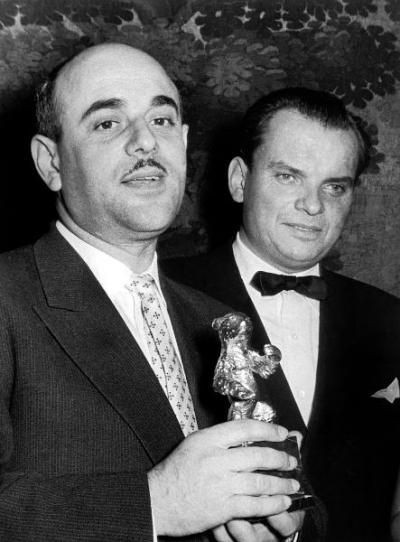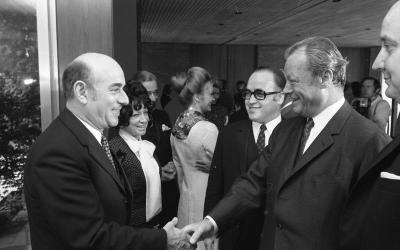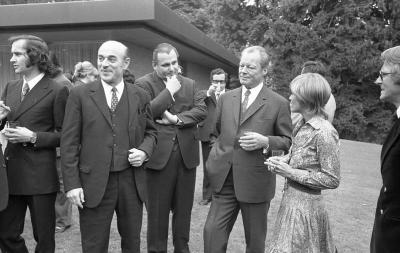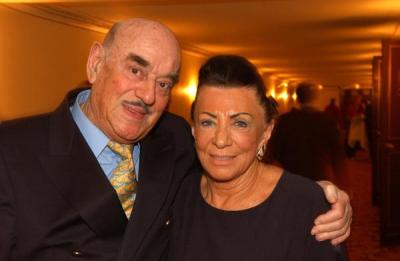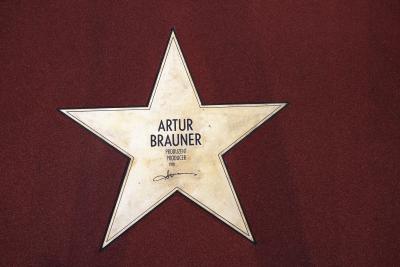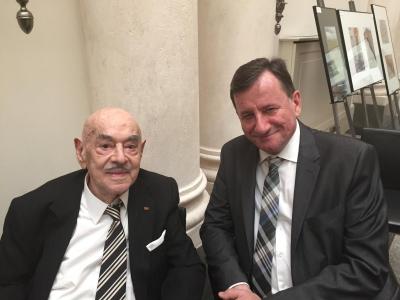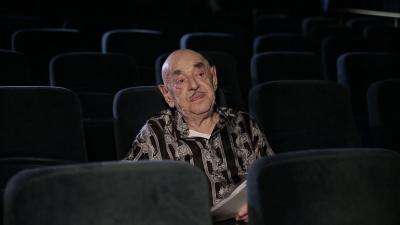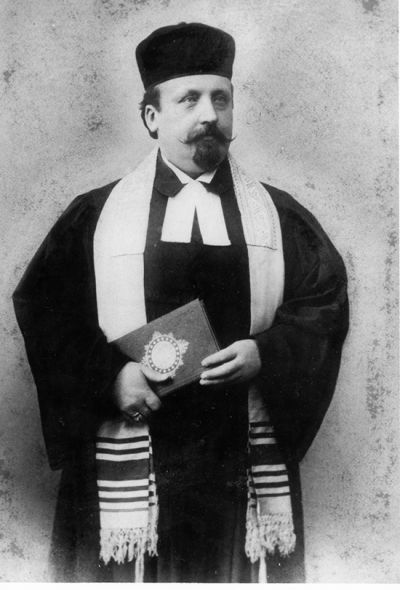Artur Brauner

When the successful Polish/Jewish film producer Artur Brauner travelled to Łódź in 1992 to be made an honorary citizen of the city, he was visiting a place where his love of movies began. Łódź was not only his home town but the place were the young Artur indulged in his passion for the movies (often without the knowledge of his parents) in the cinemas, Luna, Casino, Splendid and Bajka. He claims to have visited the cinema eight times a week, once a day and always twice on Sundays. Decades later Artur Brauner could look back on over 250 films which he had produced himself, not in Łódź however, but Berlin.
Artur Brauner was born in 1918 in Łódź. His parents were Moshe und Brana Brauner. His father was a successful timber merchant. Artur’s original name was Abraham, but as early as his time in primary school he wanted to be known as Artur. He was a bright lad who was keen on learning, played the violin, and composed songs. Shortly before the outbreak of the Second World War he began studying at the Technical College in Łódź but his studies were brought to an early end when the Germans invaded Poland in September 1939. It was not long before the multicultural city of Łódź was occupied, and the Jews where herded into the “Ghetto Lietzmannstadt”. Artur Brauner witnessed all the misery and death. But before the ghetto was finally sealed off on 30th April 1940 Artur Brauner fled the town with his family to seek refuge in the Soviet zone of occupied Poland. There in out-of-the-way, forgotten villages and forests he succeeded in surviving undiscovered until the end of the war. Nonetheless forty-nine of his relatives were murdered in the Holocaust.
After the war he first planned to emigrate to North America with his brother. On their way they stopped over in Berlin and here he remained for almost 70 years. In 1946 Artur Brauner set up a film production company entitled the Central Cinema Company (CCC-Film). The necessary financial support came from his family, above all from his brother-in-law Joseph Einstein.
Three years later in 1949 he bought up the site of an old poison factory in the Berlin suburb of Haselhorst, where he built the CCC Film Studios. In the course of time Artur Brauner produced over 700 films here, almost 270 of which were produced by himself. Although the majority of these films were pure entertainment Artur Brauner dedicated himself to themes that had shaped his life: over twenty of these films dealt with the persecution of the Jews and Nazi Germany. The most important of these include “Morituri”, “Bittere Ernte”, Hitlerjunge Salomon”, “Eine Liebe in Deutschland”, “Babij Jar”, not forgetting “Die weiße Rose“, “Mensch und Bestie” and “Der 20. Juli“. Artur Brauner’s films related to the Holocaust have been shown in Yad Vashem since 2009: since 2010 they have also been accessible in their own special mediatheque.
Artur Brauner was a highly successful film producer above all in the area of entertainment. His Edgar Wallace productions, his Karl May films and the Dr. Mabuse series are unforgettable, as are the box office hits “The Good Soldier Schwejk”, “Die Nibelungen”, “Kampf um Rom” and “Teufel in Seide”. Artur Brauner’s films always kept up with fashions and disdained no trends. His success proved him right and gave him the money to work with great stars like Romy Schneider, Sonja Ziemann, Heinz Rühmann, Maria Schell, Cornelia Froboess, Peter Alexander, Freddy Quinn, Caterina Valente, Klaus Kinski, Curd Jürgens and Gert Fröbe.
Artur Brauner constantly aimed to maintain his contact with Poland. He was also the first Western producer to produce a film in Poland. This was in 1958 when he made the film “The Eighth Day of the Week” (Ósmy dzień tygdonia), freely adapted from a short story by Marek Hłasko. The director was Aleksander Ford, and the main role was played by Brauner’s discovery Sonja Ziemann. As a result of their collaboration Brauner made three further films with Ford. After the events of “March 1968” and the anti-Semitic campaigns in Socialist Poland, Artur Brauner broke off all contacts with his native country. It was only in the 1980s that he returned to the “Polish film landscape”, where he produced films by the likes of Andrzej Wajda, Agnieszka Holland and Jerzy Hoffman.
Adam Gusowski, February 2016
Additional information:
Artur Brauner set up the “Artur Brauner Foundation” in 1991. He said that the aim of the foundation was to promote understanding between Jews and Christians as well as tolerance between people of different religions, cultural circles, skin colour and social and ethnic origins. The aim of the foundation can be especially seen in the annual award of the "Artur Brauner Film Prize" to German-language film producers whose films disseminate tolerance and humanist values to their audiences.
In 1976 the Herbig Verlag published Artur Brauner’s autobiography, “Mich gibt's nur einmal. Rückblende eines Lebens”. The book revealed that “Atze” Brauner (that is the name of the author on the cover) to be a God-given storyteller. Artur Brauner’s fascinating and sometimes humorous memories give readers an insight into the turbulent life of a successful film producer. Sadly, not more. The book concentrates on the 1950s and less on the person of Artur Brauner: it is centred on screenwriters, directors and film stars who lived and worked with him.
Awards:
1961: Bambi for “Die Ratten”
1963: Zürich Film Prize for “Die Ehe des Herrn Mississippi”
1965: Goldene Leinwand for “Old Shatterhand”
1965: Goldene Leinwand for “Der Schut”
1967: Goldene Leinwand for “Die Nibelungen”
1970: Golden Bear for “The Garden of the Finzi Continis”
1972: Oscar (best foreign language film) for “The Garden of the Finzi Continis”
1983: IFF Gijon: 3rd Prize for “Nach Mitternacht”
1983: The German Film Prize: Filmband in Silver for “Die weiße Rose”
1985: Oscar nomination for “Bittere Ernte”
1990: The German Film Prize: Filmband in Gold for many years of excellence and work in German films
1992: Golden Globe for “Hitlerjunge Salomon”
1992: Honorary citizen of Łódź
1993: The Federal Cross of Merit, 1st Class
1996: DIVA-Award (together with Franz Seitz)
1996: Scharlih Prize (Karl May Prize)
2000: Golden Camera
2002: German Critics Prize (an honorary prize)
2003: Berlinale Camera
2008: Askania Award / Berlinale watch for his life work
2010: A star on the Boulevard of Stars in Berlin
Filmography:
1948: Morituri
1949: Mädchen hinter Gittern
1950: Maharadscha wider Willen
1951: Sündige Grenze
1952: Der keusche Lebemann
1953: Hollandmädel
1954: Große Star-Parade
1955: Liebe, Tanz und 1000 Schlager
1956: Du bist Musik
1957: Die Unschuld vom Lande
1958: Wehe, wenn sie losgelassen
1958: Mädchen in Uniform
1959: Der Tiger von Eschnapur – Director: Fritz Lang
1959: Das indische Grabmal – Director: Fritz Lang
1960: Der brave Soldat Schwejk – Director: Axel von Ambesser
1960: Die 1000 Augen des Dr. Mabuse – Director: Fritz Lang
1961: Willy auf Sondermission
1961: Via Mala
1961: Im Stahlnetz des Dr. Mabuse – Director: Harald Reinl
1962: Die unsichtbaren Krallen des Dr. Mabuse – Director: Harald Reinl
1962: Das Geheimnis der schwarzen Koffer
1962: Im Schatten einer Nacht
1962: Der Tod fährt mit and
1962: Das Ungeheuer von London-City
1962: Das Testament des Dr. Mabuse
1962: Der Fluch der gelben Schlange
1962: Sherlock Holmes und das Halsband des Todes
1963: Old Shatterhand
1963: Der Würger von Schloss Blackmoor
1963: Scotland Yard jagt Dr. Mabuse
1963: Der Henker von London
1964: Das Phantom von Soho
1964: Das 7. Opfer
1964: Die Todesstrahlen des Dr. Mabuse
1964: Der Schut
1964: Fanny Hill – Memoiren eines Freudenmädchens – Director: Russ Meyer
1965: Der Schatz der Azteken
1965: Durchs wilde Kurdistan
1965: Die Pyramide des Sonnengottes
1965: Im Reiche des silbernen Löwen
1966: Die Nibelungen 1 – Siegfried – Director: Harald Reinl
1967: Die Nibelungen 2 – Kriemhilds Rache – Director: Harald Reinl
1967: Geheimnisse in goldenen Nylons
1968: Winnetou und Shatterhand im Tal der Toten
1968: Kampf um Rom 1 – Director: Robert Siodmak
1968: Kampf um Rom 2
1969: Das Geheimnis der schwarzen Handschuhe
1970: Black Beauty
1970: Vampyros Lesbos – Erbin des Dracula – Director: Jess Franco
1970: Sie tötete in Ekstase – Director: Jess Franco
1971: Der Todesrächer von Soho – Director: Jess Franco
1971: Der Teufel kam aus Akasava – Director: Jess Franco
1971: X 312 – Flug zur Hölle – Director: Jess Franco
1972: Das Geheimnis des gelben Grabes
1972: Dr. M schlägt zu – Director: Jess Franco
1974: Ein Unbekannter rechnet ab
1983: S. A. S. Malko – Im Auftrag des Pentagon
1983: Eine Liebe in Deutschland
1983: Blutiger Schnee
1987: Hanussen – Director: István Szabó
1990: Hitlerjunge Salomon – Director: Agnieszka Holland
1996: Von Hölle zu Hölle
2002: Babij Jar – das vergessene Verbrechen
2002: Der Teufel, der sich Gott nannte
2006: Der letzte Zug – Director: Joseph Vilsmaier
2010: Wunderkinder
2013: Auf das Leben!
